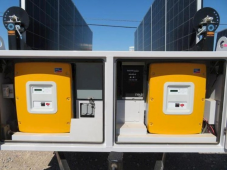Rednecktek
Solar Wizard
So after 30 pages and a MAJOR derailment the NEC2020 thread was shut down, which is good. However, I find myself really really confused about all of it and with some questions still for the off/on/both grid world of my cabin. So, I figure I'd try a new thread that has actual answers instead of rambling.
1: Is there anywhere I can find a layman friendly, concise summary of what's required for an off-grid solar system? The NEC books were written for inspectors and engineers.
2: What are the loopholes or workarounds to dodge all the new regulations that make DIY solar a non-starter or for people on a budget that DON'T have braodband internet for their systems?
My use case is such:
In my pump house I already have a 30a 240v generator plug wired into an interlocked breaker on my main service panel. My 7500w generator is plugged into that to feed the well pump and lights/outlets, but it also consumes a gallon of gas per hour to idle. I would use a smaller generator but I need the extra oomph for my 300ft deep well pump. I currently have an interlocked panel at the cabin itself that I run an extension cord out to my smaller 3500w generator for daily use when I'm actually up there and it's actually overkill for my needs (I spent a couple weeks up there recently and never broke 1500w with the AC on max) so I really only need the big generator for the well pump about 10 minutes a day.
I've been working for a few years to get power run up to the well pump and I'm almost there, but deployments and inspection/connection seasons rarely line up with my shore time, so it's taking forever.
Either way, what I'd like to do is set up some ground mount panels and a solar array in the shed that can power the well pump as well as the cabin if the grid goes down (because "rural" starts an hour away and I don't trust lines to get fixed quickly, plus independence is nice) but it sounds like with the new NEC2020 I'd have to spend more than the property is worth to check all the boxes and get all the blessings.
So, my options seem to be:
1: Do it anyways and hope the inspector doesn't show up.
2: Find a loophole that makes the system not fall under NEC2020 rules.
3: Win the lotto and get something legit installed.
Ideas for option 2? I seem to recall something about if it's lead acid it doesn't count or if it's a "solar generator" it doesn't count? Being plugged into an interlocked socket can I make it a "portable solar generator" and still be on racks in the building or do I need to get wheels involved?
Thanks all!
1: Is there anywhere I can find a layman friendly, concise summary of what's required for an off-grid solar system? The NEC books were written for inspectors and engineers.
2: What are the loopholes or workarounds to dodge all the new regulations that make DIY solar a non-starter or for people on a budget that DON'T have braodband internet for their systems?
My use case is such:
In my pump house I already have a 30a 240v generator plug wired into an interlocked breaker on my main service panel. My 7500w generator is plugged into that to feed the well pump and lights/outlets, but it also consumes a gallon of gas per hour to idle. I would use a smaller generator but I need the extra oomph for my 300ft deep well pump. I currently have an interlocked panel at the cabin itself that I run an extension cord out to my smaller 3500w generator for daily use when I'm actually up there and it's actually overkill for my needs (I spent a couple weeks up there recently and never broke 1500w with the AC on max) so I really only need the big generator for the well pump about 10 minutes a day.
I've been working for a few years to get power run up to the well pump and I'm almost there, but deployments and inspection/connection seasons rarely line up with my shore time, so it's taking forever.
Either way, what I'd like to do is set up some ground mount panels and a solar array in the shed that can power the well pump as well as the cabin if the grid goes down (because "rural" starts an hour away and I don't trust lines to get fixed quickly, plus independence is nice) but it sounds like with the new NEC2020 I'd have to spend more than the property is worth to check all the boxes and get all the blessings.
So, my options seem to be:
1: Do it anyways and hope the inspector doesn't show up.
2: Find a loophole that makes the system not fall under NEC2020 rules.
3: Win the lotto and get something legit installed.
Ideas for option 2? I seem to recall something about if it's lead acid it doesn't count or if it's a "solar generator" it doesn't count? Being plugged into an interlocked socket can I make it a "portable solar generator" and still be on racks in the building or do I need to get wheels involved?
Thanks all!



